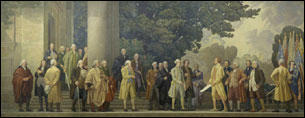The Last, Best Hope

Samuel Adams (1722–1803) - 1776
I get a little misty this time of year.
Your Independence Day calls to mind the follies and friends of my youth, and even more vividly - my enemies. I knew the composers of the Declaration of Independence, the Committee of Five – John Adams, Thomas Jefferson, Benjamin Franklin, Robert Livingstone, and Roger Sherman. Jefferson wrote the first draft; as he put it, the committee “unanimously pressed on myself alone to undertake the draught [sic]. I consented; I drew it; but before I reported it to the committee I communicated it separately to Dr. Franklin and Mr. Adams requesting their corrections. . . I then wrote a fair copy, reported it to the committee, and from them, unaltered to the Congress." The Congress voted to adopt the Declaration late in the afternoon of July 4th of 1776. This was an Act of War against Great Britain, and a shift in the tectonic plates of history.
The breaking off of the American Colonies was an act with as great a cultural significance as the Norman Invasion, the defeat of Marc Anthony, and the conquest of Byzantium, marking the foundation of the British, Roman and Ottoman Empires, respectively. Gifted with fantastic natural resources, the North American Continent was always destined to become a great nation – the question was what kind it would be. As Dr. Franklin told the anxious crowd outside the Constitutional Convention, “A Republic, if you can keep it”.
But the Fourth of July is about the getting of it rather than the keeping of it. Much attention is always given to the eloquent preamble, less to the laundry list of grievances, and little to the most interesting part – the conclusion. Here is what the Five presented as the desirable end result of their efforts -
We, therefore, the Representatives of the UNITED STATES OF AMERICA, in General Congress, Assembled, appealing to the Supreme Judge of the World for the Rectitude of our Intentions, do, in the Name, and by Authority of the good People of these Colonies, solemnly Publish and Declare,
That these United Colonies are, and of Right ought to be, Free and Independent States;
That they are absolved from all Allegiance to the British Crown, and that all political Connection between them and the State of Great-Britain, is and ought to be totally dissolved;
and that as Free and Independent States, they have full Power
To levy War,
Conclude Peace,
Contract Alliances,
Establish Commerce,
and to do all other Acts and Things which Independent States may of right do.
And for the support of this declaration, with a firm Reliance on the Protection of divine Providence, we mutually pledge to each other our Lives, our Fortunes, and our Sacred Honor.
If you signed this, you were a marked man. Make no mistake, if the American Revolution had not been a success, and you had signed this document, you would be hung as a traitor. The references to honor and life are not hyperbole, but a statement of fact. The success of the Revolution was far from a foregone conclusion, or a ‘self-evident truth’. To understand the pressures of neighbor against neighbor and to enjoy a great lost classic, consider reading the novel, ‘Oliver Wiswell’ by Kenneth Roberts, the story of an honorable man from the Blue Hills outside of Boston, caught up in revolutionary times, but unable to overcome his scruples regarding loyalty to the Crown, a reluctant and troubled Loyalist. I knew so many like him, who had lost their families and fortunes, swept away in a tide which engulfed a continent.
It seems so easy in hindsight. Yet of the 13 Colonies, only 9 voted to ratify the Declaration of Independence on July 4, 1776. Eventually, 56 delegates signed the engrossed copy, most of them on August 2nd. Some like your future Governor Elbridge Gerry, famous for his ‘Gerrymandering’ of Massachusetts for political gain, delayed signing. In fact, Thomas McKean didn’t sign until 1781 – and some like Robert Livingstone of the Committee of Five never signed at all.
So on Independence Day, go to the picnics, listen to the ooom-pah music, wave your flag, ooohhh and aaahhh at the fireworks, and ask yourself – in your heart of hearts - would you have signed the Declaration that could be your death warrant? Please, take the time to thank and revere the men who did sign it, and remember that the kind of men they were in large part determined the kind of nation you became.







1 Comments:
Oh hell yeah I would've signed it and instead of people asking ya ta put yer John Hancock right here, when askin ya ta sign they would be sayin Bandana this for me..
Stand Yer Ground, Bandana
Post a Comment
<< Home